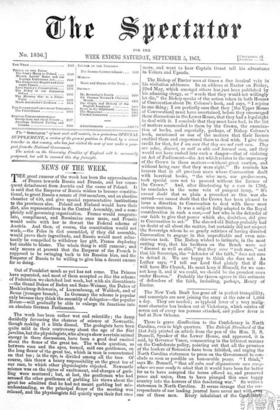The Bishop of Exeter uses at times a fine ironical
vein in his visitation addresses. In an address at Exeter on Friday, 22nd May, which amongst others has just been published by his admiring clergy, as " words that they would not willingly let die," the Bishop speaks of the action taken in both Houses of Convocation about Dr. Colenso's book, and says, "I rejoice in one thing; I am perfectly sure that they [tile Upper House of Convocation] must have ascertained, before they encouraged these discussions in the Lower House, that they had a legal right to deal with it. I conclude that they must have had, in the list of matters commended to them by the Crown, the examina- tion of books, and especially, perhaps, of Bishop Colenso's book, mentioned as one of the matters that their licence enabled them and empowered them to deal with. I give them credit for that, for I am sure that they are not rash ?nen. They are sober, discreet, as well as able and learned men, and they would not have rushed into such a danger—that of violating an Act of Parliament—the Act which relates to the supremacy of the Crown in these matters—without great caution, and without being sure that they were right." lie reminds his hearers that in all previous cases where Convocation dealt with heretical books, " the wise men, our predecessors, took special care not to proceed without the licence of the Crown." And, after illustrating by a case in 1702, he concludes in the same vein of pungent irony, " We cannot doubt that so plain a precedent as this was ob- served—we cannot doubt that the Crown has been pleased to issue a direction to Convocation to deal with these most serious matters. It was a subject fully adapted to the Royal consideration in such a case,—of her who is the defender of our faith to give that power which she, doubtless, did give to Convocation to act." The shrewd old Bishop probably had no doubt at all about the matter, but certainly did not suspect the Sovereign !whom he so gently satirizes of having directed Convocation to .engage in this unprofitable and even mis- chievous task.' The Bishop wished to intimate, in the most cutting way, that his brethren on the Bench were not " discreet as well as able," that they were " rash men," and that his Sovereign,. the " defender of the faith," does not care to defend it. We are happy to think she does not. As Luther says; "I tell our Lord God plainly that if He will have His Church, He must keep it Himself, for we can- not keep it, and if we could, we should be the proudest asses under Heaven." Probably the Queen agrees in this estimate of defenders of the faith, including, perhaps, Henry of Exeter.






























